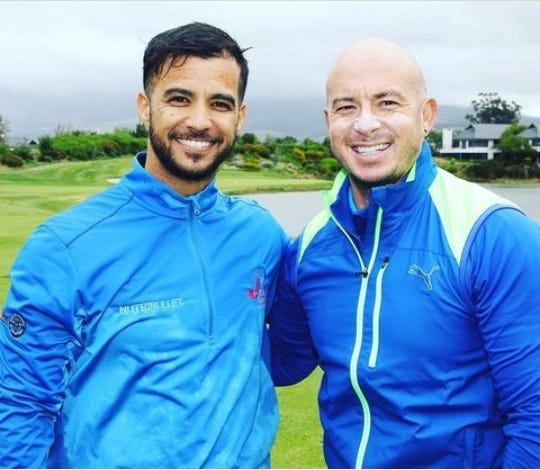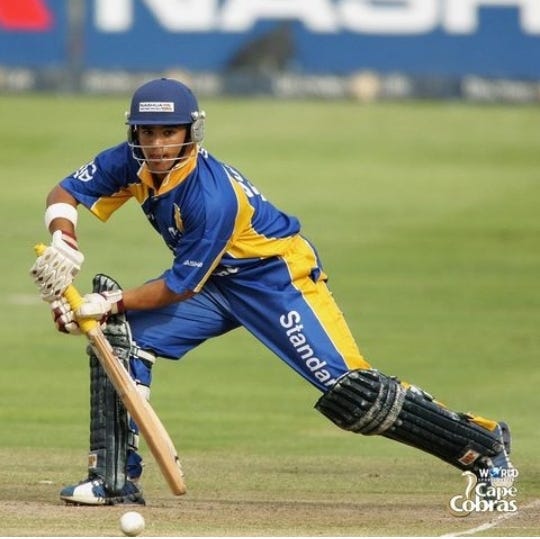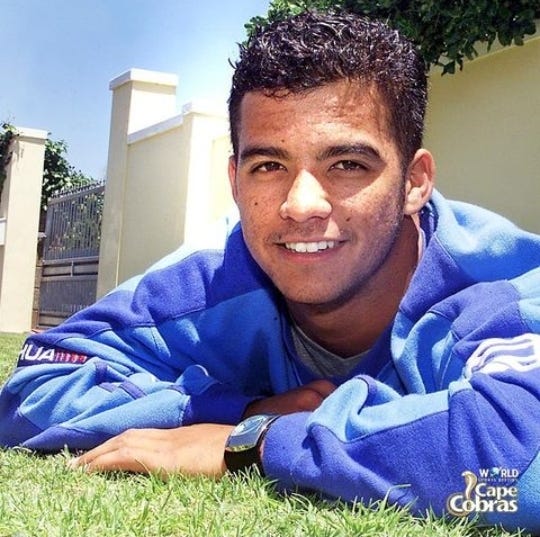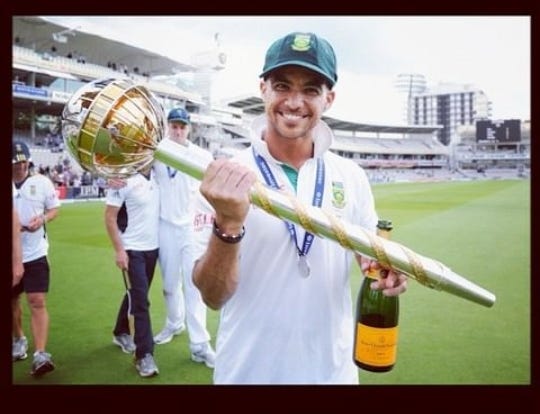JP Duminy's legacy
Prodigy, giant slayer, servant of the game, philanthropist, coach and commentator...
JP Duminy had an amazing career in South Africa colors, but he doesn't want his legacy to be another one that tells a story of just another professional cricketer who represented his country. He wants it to be about more than just that.
Who would have thought that JP Duminy's father could have had a chance meeting with Herschelle Gibbs in a club, of all places in Cape Town? Well, it happened in 1999.
I don't suppose that Gibbs had any idea that this kid he was visiting would be a future Proteas teammate. He wouldn’t probably have believed JP’s father if he had said so, because that is what fathers do right? They are often their children’s hype men and will exaggerate their talents. As far as he was concerned he was just visiting another young fan, which was very much on brand for Gibbs. He was good like that.
In his 2010 book, To The Point, Gibbs confessed, “I am also a pretty generous guy, both with my money and my time. And that’s not a boast. Lord knows, it’s got me into trouble often enough.”
This was one of the times it didn’t get him into trouble, because he was visiting just another kid from Strandfontein who had taken on to playing cricket in the streets using a black rubbish bin as wickets around the ages of 5 and 6. A kid who, at 9, had only enrolled at Strandfontein cricket club because his best friend at the time had also registered there.
He was visiting a teen who looked up to him, mimicked his playing style, and yet just wanted to play sports with his friends and have fun with them.
"In this day and age, you would probably call it the social media age, and that's how kids entertain themselves. When I was younger it was all about playing in the streets. Playing sports with your friends in the community,” says JP Duminy.
In fact, JP really didn't think much of his abilities or potential in a career as a professional cricketer. And even though he didn't he didn't think of it, his father did. He saw enough to understand that there was something special about him. Not just his father, his grandparents probably saw it too, which would explain why they never missed a match.
"My dad was probably the one who recognized that potential at an early age. From around 10 or 11 he had belief that I would play for South Africa. Whereas for me, I just wanted to have fun with my friends. You know, just enjoy the game. But he saw something that I wasn't aware of back then," JP recalls.
Anyway, Herschelle Gibbs' visit made such an impression on him that he holds on to that memory, and even now that he is retired, it's still a fond memory for him.
“To this day I am still a little gobsmacked that he agreed. For my 15th birthday he rocked up on my front door - it was the most amazing thing,” JP smiles.
Gibbs’ visit made such an impression that even though he does not think of his actions in connection with that incident, he hopes to do the same for others - not surprise them at their homes, obviously, but to make a lasting positive impression.
One way he does that is by sharing his journey and the lessons that he learnt along the way. JP had boatloads of talent. And if he didn't realize it earlier, he must have known that something was up when he signed a professional contract with Western Province at 17. He must have known by then that he was a prodigy. I mean, not many kids in matric get to sign professional contracts.
"I was very fortunate to receive my very first contract at 17. I was still in matric when I was signed by Western Province. I made my debut for the Western Province amateur side in Grade 11."
And like most prodigies, he dominated the amateur scene, then he hit a bump on the road when he was 20 after he was called up to the Proteas. With scores of 4, 22, 3, 0, 0, it was a nightmare start to his international career. It was a really difficult period for him. He faced a circumstance that either makes or breaks prodigies: he realized that his talent alone wouldn't take him very far.
“It wasn't my best tour and I realized that I am way behind the 8-ball in terms of fitness levels, my mental approach to the game. And that was quite a dark time in my career. I questioned whether I was good enough and I was questioning whether this was something that I wanted to do. Things weren't going my way, whereas the first three years of my professional career, for the most part, it went pretty well,” says JP.
Thing is, when prodigies fail on the big stage they are overcome by feelings of inadequacy. That is the one time they come face to face with the expectations that everyone around them has. Failure on a big platform reveals a scary truth: they have flaws and this scares the hell out of them, so they question whether they possess enough talent to satisfy those expectations. 'Am I good enough?' That is one question they ask of themselves. Some, like Lenny Cooke, walk away from the sport they love, because they fail to answer that question with a convincing yes.
Those with a growth mindset find a way around the problem, but those with a fixed mindset are damaged for life. Thankfully for JP, he had a growth mindset.
"I had to make a decision right then. Am I going to continue with this mindset of relying on my talent or am I going to make certain shifts in terms of how I do things: my preparation, fitness..? I needed to make a mental shift so that my physical capabilities were better," he says.
And even though JP Duminy had decided that he needed to make certain changes, he did feel a certain emptiness about him. He had fallen out of love, cricket became a chore. This is also one of the problems that comes with early achievement, prodigies and failure. Remember Beverly Klass, a one time golfing sensation, who fell out of love with golf because of the pressure and image that she had to live up to.
“I remember going to the CSA academy in 2005, and we were asked the question 'what do you want to achieve out of this?' And I remember saying that I needed to find the love for the game again because my experiences had led me to question a lot of things. Moments of anxiety, doubt and fear. I was questioning everything, questioning my abilities, my talents.”
JP struggled with that. He suddenly wasn't sure if he had the right qualities to make it. But his doubts at this stage were not as acute as the ones he had had as a teenager, after a horrific season where he averaged a mere 7 runs. But he had a strong support system, a support system that had his parents, his grandparents who never missed a match in their blue Toyota Corolla that became a permanent feature at matches. And the support system that got him through the horrific season as a teenager got him through the horrific debut for the Proteas.
"The important thing is to not give up. The old cliché about surrounding yourself with people that are really going to influence you in a positive way is so true. In my case, I was fortunate to have my parents, coaches, management staff who were really influential in my thought process."
These are some of the things that he can help other athletes with. He wants to be one of the positive influences to other athletes. Not just early struggles in their careers, but also how to deal with the dark side of professional sports: disappointment, failure, anxiety, doubt. And having gone through it all, JP can share all this with others, how to deal with these moments when they arise. After all, there are always going to be various levels of disappointment, doubt and fear.
"You go through these periods of doubts at different parts in your career. For me it was at 15, then at 20 when I got into a new level of cricket and you wonder whether you are good enough. Then further down the line you question whether you are good enough to stay there. And further down the line you question whether you are over the hill," says JP.
He hopes that by sharing his own vulnerabilities, opening up to others will also get others to accept and acknowledge these fears and doubts, because a lot of cricketers face them too.
“It's part of the journey of growth that you will go through these moments. Over 70 or 80% of professionals go through this. Now the goal is how do we lessen those moments?” Asks JP.
?si=UCEtCnEuTNqT-B9e-Nrn5g&dl_branch=1
But, it is not just about JP approaching things as if he knows everything just because he faced difficulty in his career. He is also ready to walk with other cricketers on a path to find answers to whatever problems that they can be facing. He understands that we all need someone and he also understands the unique position he is in as a respected former player, he already commands respect and credibility in the eyes of many, and these are the things that he wants to take advantage of in his quest to be that someone to others.
"I look back on the journey with gratitude and wanting to share with others, so that they don't necessarily have to live through that, but to learn from my experiences. It's just about learning, it's about walking that journey with the next generation. And that's why getting into the coaching world is exciting for me,” says JP Duminy. “For me the ultimate foundation of coaching is relationships. It's the foundation of environments working smoothly, environments moving and growing. Going into the professional coaching world, that is my foundation, that is my starting point: building relationships with my environment. And not trying to be something that I am not, but instead trying to be sincere. If I don't know something, let's go find the answer together, and not trying to pretend like I know it all."
Of course, he is not just prepared to share and help with the difficult moments. He has also enjoyed great highs, and can help others prepare for them. Who can forget his debut Test series, against Australia in Australia? The Test debutant was peppered by the Australian pacers with short balls, got hit a lot, but he held his own. Kallis had told him to make history in his first ever Test innings, in the end they made history together as South Africa recorded a memorable first against the Australians.
He has had his fair share of moments of greatness. From his contributions in the Test series against England in 2012 when the Proteas defeated England 2 nil to lift the Test mace, to being a member of the team that was to be the first one to defeat Sri Lanka at home, among the many memorable incidents.
And JP is not limiting his actions to coaching. He also wants to make an impression on regular people, he wants to serve his environment. That is one thing that he has always done, even when he was with the Proteas, he served the team and he served his teammates. He has always been one to take initiative and was always ready to lead without a title. Which is probably why he was the perfect ambassador for the Protea Fire campaign. A project that he took to heart.
"I took that campaign to heart. I looked at it and thought, 'okay, how do I use this opportunity to really influence the greater community of South Africa?' And I needed to be genuine and sincere about that,” says JP.
And from 2015, the moment when the concept of Protea Fire (#ProteaFire) was revealed to the public, he took it beyond the field. He started searching for ways to influence people off the field as with his language, by carefully choosing his words when interacting with fans and building deep connections with people, even if they are only momentary connections - for a few seconds at times.
“As an example, if you come to me and say, 'JP can I have your autograph please?' So, the easiest thing is to grab a pen and sign, and just move on. And there's nothing wrong with that,” he says. “But I am seeing it as an opportunity to sign the autograph, and for that 10 seconds that you are there, be present, connect to that person, 'hey man how are you doing? Nice to meet you.' Can you leave an everlasting thought and experience for that person for that 10 or 15 seconds, so that they can look back and go, 'wow, that is a moment in my life that I will cherish.'"
And while he tries his best to create these connections, JP Duminy also understands that there are times that he cannot create these moments, he accepts that reality. However, that does not stop him from trying. He is very intentional about it. He is very intentional about serving the people around him and his environment. And this is why he set up the JP12 Foundation.
The JP12 Foundation is active in Mitchell's Plain, a massive community with over a million people and about 56 schools - 56 primary schools. As of 2015, only 4 of those schools were playing cricket. By 2021, the JP Duminy Foundation had increased the number to 38. And JP is the first one to admit that the growth in number is not merely because of their hard work, but is also due to the principals, teachers and parents understanding what they are trying to achieve and taking part in the program.
“We run primary school cricket, we coordinate and facilitate the process. And we are reliant on all the school principals, teachers, sports coordinators to play ball and play part, and collectively see this vision of getting cricket to be an influential sporting code in the community again,” explains JP.
JP shares that while the objective is to get kids active and playing cricket, thereby growing the sport, the program is much bigger than just that. Everyone involved is aware of the many lessons, life lessons, that can be learnt from sport. Kids learn early on the ability to operate as a team, to think beyond oneself, team camaraderie, team spirit, enjoying other people's successes.
“There are various disciplines that you can learn from cricket as a young boy or girl,” says JP.
And so far, JP Duminy is happy with the results.
"We've seen kids coming to school excited. They look forward to after school. We've seen the skills of kids grow. We've seen teachers excited to be a part of this. We've seen parents excited to see their kids flourishing," says JP Duminy who hopes to influence kids from the Mitchell’s Plain community to dream beyond their immediate surroundings.
That is the legacy he hopes to leave. A legacy of having served others in cricket and the environment around him.
"I am more people focused. How can I help people be better for themselves? How can I help people get through challenges in life? How can I help people just experience things with a different lens. And I mean that holistically, from a spiritual point of view, a career oriented point of view, from a life point of view. How can I assist them experience life to the fullest? That is my get up in the morning. How can I influence the next person in a positive way. How do you leave an everlasting imprint in their lives when you meet them?"
And so, whether it is through commentary, coaching, interactions family, friends and regular people, if he can make a connection and leave a positive imprint on the minds of others in the same manner that Herschelle Gibbs touched his life as a teen, then he is happy.
Thank you to everyone who has shown their appreciation of my work and this newsletter. I am entirely freelance and have no intention of putting content behind a paywall. However, for me to be able to continue producing more content, I depend on your patronage. So, please do support my work on Patreon.
Alternatively you could Buy A Coffee.
Also, please encourage anyone whom you think may be interested in my work to subscribe.











"As of 2015, only 4 of those schools were playing cricket. By 2021, the JP Duminy Foundation had increased the number to 38." - I really enjoy stories of people who are growing the sport or taking the sport to new communities/areas.....Well-written as usual